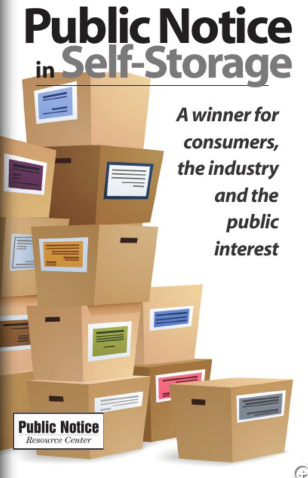Consumer and public safeguards in 46 states require operators of self-storage facilities to notify the public in a local newspaper before offering a renter’s goods for an auction after a default. But pressure on legislatures to eliminate this requirement have caused a handful of states to leave the notification requirement to the facility owners.
The Public Notice Resource Center’s (PNRC) new book, “Public Notice in Self-Storage: a winner for consumers, the industry and the public interest,” explains in detail the background and basis for the public notice. The book makes a solid case that when facility owners are left unregulated to set up their own auctions, advertise them as they wish and dispose of property, the public and consumers are the losers.
PNRC President Bradley L. Thompson II said the booklet was the second publication by the Center to put the facts and history of public notice into the hands of consumer and industry groups seeking the best ways to keep the public informed in matters of public interest.
“Because no court is required to give a storage facility owner the permission to auction off all of a renter’s goods, and because the possibility that an auction will net significantly less than the goods may be worth, the American public has a strong interest in ensuring this process is carried out as transparently as possible,” Thompson said. “The concern is that some facility owners will be tempted, if there is no legal requirement to the contrary, to publicize their auctions only on their own websites or only to a list of insiders, these auctions will disappear from public view. That is not good for consumers or the reputation of the industry.
“Our research indicated that the public notice was set up to stand in for the courts, so due process would be followed,” he said.
Today’s mobile society creates great demand for storage space. But the agreements required by commercial facilities are often difficult for consumers to understand and follow. A slip-up in payments, change in bank accounts or simple faults in communication can lead a consumer to miss out on the fact that a facility has judged him or her to be in default. State laws allow the facility owners to simply send a letter to the last known address of the renter before proceeding to auction. Because the facility owners are permitted to keep only the money due from unpaid rent, they have little incentive to seek the maximum price for the goods.
Subscribing partners can view PNRC’s self-storage book here. Single copies of the booklet are $29.95; bulk pricing is available. All proceeds support the Public Notice Resource Center, a non-profit organization whose mission is to collect, analyze, and disseminate information on public and private notifications to the public through local newspapers, and to educate the public on the value and use of its right to know.

